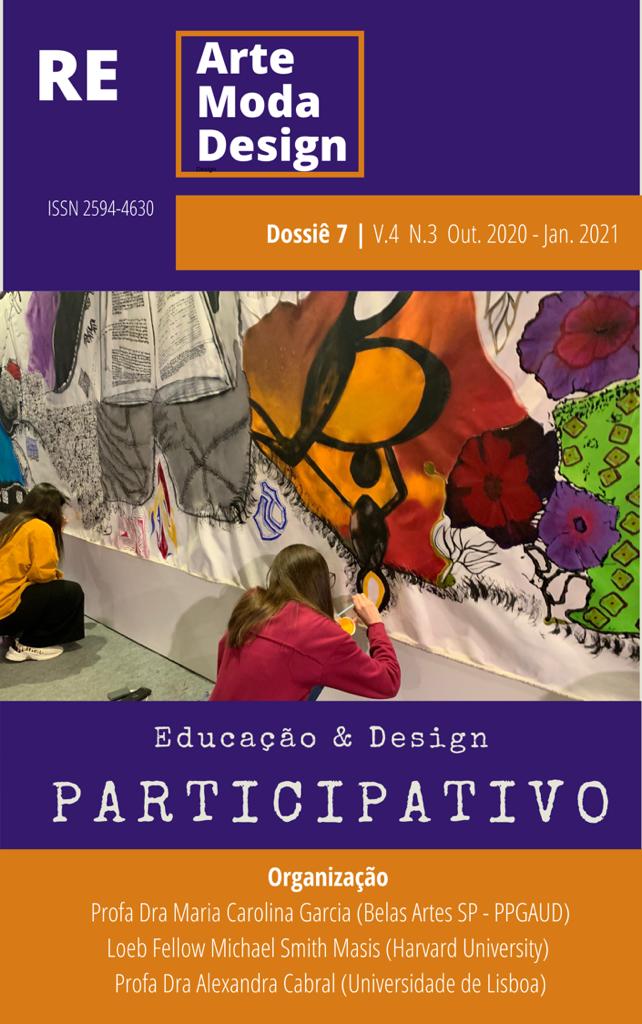O design participativo como metodologia de trabalho na educação formal e em práticas cotidianas
DOI:
https://doi.org/10.5965/25944630432020211Resumo
No presente trabalho, apresenta-se a compilação de uma entrevista realizada por uma docente do Ensino Superior (UFRPE) a uma outra colega de trabalho (Unisinos), a entrevistada que reflete e discute questões relacionadas aos Design Participativo (DP). O caminho da conversa trilhado pelas profissionais abrange não apenas o âmbito educacional, mas o da vida cotidiana, isto é, trata também de como o DP pode ser considerado pragmaticamente para o desenvolvimento e/ou acompanhamento de atividades práticas concernentes e decorrentes de outras dimensões do cotidiano do sujeito social. No percurso de construção do pensamento proposto, termos como curiosidade, proatividade, independência, autonomia e coletividade foram bastante recorrentes para repensar práticas pedagógicas e profissionais que não se restringem ao Design, pois são quesitos necessários a quaisquer atividades em que se intenta que todos que nelas estejam envolvidos participem. No decorrer da entrevista, verificou-se como a adoção das concepções do DP se apresenta como uma prática desafiadora, tanto no campo educacional como na perspectiva de sua atuação em outros campos
do saber. Por fim, ressalta-se que, no que concerne aos aspectos técnicos da entrevista, ela foi realizada através da plataforma de vídeo conferência Jitsi Meet, e teve duração aproximada de 40 minutos, gravada via aplicativo de áudio, disponível para sistema Android – e, na sequência, foi transcrita e organizada de acordo com as normas da língua, tendo sua aprovação para publicação por parte da professora entrevistada.
Downloads
Downloads
Publicado
Versões
- 01-10-2020 (2)
- 02-10-2020 (1)
Como Citar
Edição
Seção
Licença
Copyright (c) 2020 Jaqueline Ferreira Holanda de Melo

Este trabalho está licenciado sob uma licença Creative Commons Attribution 4.0 International License.
- Autores mantém os direitos autorais e concedem à revista o direito de primeira publicação, com o trabalho simultaneamente licenciado sob a Licença Creative Commons Attribution 4.0 Internacional, que permite:
1. Compartilhar — copiar e redistribuir o material em qualquer suporte ou formato para qualquer fim, mesmo que comercial.
2. Adaptar — remixar, transformar, e criar a partir do material para qualquer fim, mesmo que comercial.
O licenciante não pode revogar estes direitos desde que você respeite os termos da licença.De acordo com os termos seguintes:
1. Atribuição — Você deve dar o crédito apropriado, prover um link para a licença e indicar se mudanças foram feitas . Você deve fazê-lo em qualquer circunstância razoável, mas de nenhuma maneira que sugira que o licenciante apoia você ou o seu uso.
2. Sem restrições adicionais — Você não pode aplicar termos jurídicos ou medidas de caráter tecnológico que restrinjam legalmente outros de fazerem algo que a licença permita -
Plágio, em todas as suas formas, constitui um comportamento antiético de publicação e é inaceitável. Esta revista utiliza o software iThenticate de controle de similaridade.






